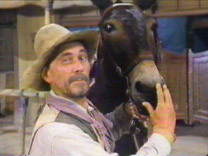Chew on this: the difference between a
Bad Habit and a Behavioral Disorder
Ken Marcella, D.V.M.
When you're nervous or anxious, do you exhibit behavior rarely
apparent at other times? Do you, perhaps, chew on a pen cap, play
with keys in your pocket or twirl a few strands of hair?
Most of us do. And many horses also exhibit anxious traits.
It's estimated that 15 percent of domestic horses exhibit similar
behavior, called obsessive-compulsive disorder (OCD). This
includes cribbing, pawing, weaving, blanket-chewing, head-bobbing
or other repetitive actions.
These are often referred to as stable vices, but are actually
different. Vices are unwanted and undesirable reactions that can
be corrected through proper handling and training.
Obsessive-compulsive behaviors are abnormal expression of normal
behavior.
Cribbing is an obsessive-compulsive behavior. The cribber uses
its upper teeth to grab a stationary object, such as a fence
board, then arches its neck, pulls backwards while swallowing air
and grunting. (A wood chewer, on the other hand, actually chews
and destroys fence and stall boards.) Cribbing is not only rough
on barns and fences, but it also may be detrimental to a horse's
health. The horse wears down his teeth and swallows air which can
lead to inappropriate digestion and colic. Some equine insurance
companies won't provide insurance for cribbers.
It's not known what causes OCDs in horses. There may be 30 horses
in a barn with the same management, but only two will crib; how
each individual handles stress plays an important role.
There appears to be an inherited susceptibility to stress in
horses, so genetics are part of the answer. Improper diet and
feeding practices are commonly cited as factors that may lead to
cribbing.
To reduce cribbing...
Provide companionship
Allow time to graze and roam
Train and handle consistently and intelligently
Feed less grain concentrate (consider using higher-fat rations)
Feed more roughages (consider using forage supplements)

OCDs have not been reported in free-ranging wild or semi-wild
horses. These animals live as horses have lived for thousands of
years. They spend 90 percent of their time grazing, and the
action of using upper teeth to grab and pull on plant material is
routine.
Horses have small stomachs so wild horses are constantly using
their mouths and always have full stomachs.
Domestic horses -- especially those kept in stalls all day --
spend less than 30 percent of their time eating and often have
empty stomachs. A horse's inability to graze can be a significant
stress that is commonly thought to lead to repetitive cribbing
behavior.
That cribbing can be greatly reduced by allowing horses more
pasture time seems to support this view. Many stall cribbers do
not crib in the field, though the worst cases will crib inside
and outside.
Reducing stress does not always stop the behavior. In these
cases, cribbing horses are sometimes fitted with thick straps
that put pressure around the neck and prevents the horse from
using the muscles necessary for cribbing.
The straps have several configurations, from severe ones with
metal pins that pinch if the horse tries to crib, to a collar
that places pressure over the forehead to stop the behavior,
which some claim is more humane.
There are surgical procedures in which muscle is removed to stop
the behavior. They are disfiguring and do little to address the
cause.
New research with drug therapy shows that repetitive behavior may
cause the body to release natural painkillers called endorphins.
When the horse cribs because of a stressful environment, it
releases endorphins, which reduce the stress and make it feel
better. Drugs that block the body's release of endorphins can
stop cribbing.
Injecting drugs such as Naloxone, or some other anti-depressant,
may stop cribbing. Such drugs are short-acting and therefore
impractical, however. More research is being done to create
similar, longer-acting drugs.
Finally, please stay away from electro-shock collars used to
discourage cribbing. I agree with Dr. Nicholas Dodman, professor
of veterinary medicine and director of the Animal Behavior Clinic
at Tufts University, who categorizes this as a "hideous idea"
that does not work.